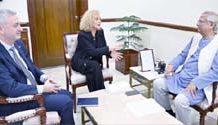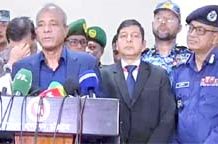C T Online Desk: More than 10,000 people, including about 4,000 Rohingyas on no man’s land near Tambru border, in Naikhyangchhari of Bandarban have been passing their days in panic as the Myanmar military continued flying fighter jets and drones and using mortar and machine guns to fire into Bangladesh territory since August.
In the latest attack on Friday, at least three mortar shells were fired into Bangladesh from Myanmar between 8:15pm and 9:00pm, killing a 17-year-old adolescent boy, Mohammad Ikbal, and injuring six others, who were hospitalised later in the night.
Home minister Asaduzzaman Khan, talking to the journalists in Dhaka, insisted that Bangladesh would deal with the issue diplomatically and, if necessary, the government would raise the matter with the United Nations.
UN Resident Coordinator in Bangladesh Gwyn Lewis told New Age that her office was concerned about the landing of mortar shells in Bangladesh from Myanmar, reportedly killing one person and injuring several others.
‘The lives of civilians must be protected and the UN is calling for calm to avoid any further injury or escalation’ Gwyn Lewis said, adding, ‘The UN security teams are monitoring the situation closely.’
Since the latest shelling, the foreign ministry has been in close touch with the security forces and intelligence agencies to assess the ground reality in order to take ‘pragmatic decisions’ as the government instructed border guard forces to remain alert to Myanmar’s ‘provocative’ military acts that started in mid-August.
Experts said that it was a matter of concern for Bangladesh as Myanmar continued firing mortar shells into its territory while fighting insurgency within.
They said that the Myanmar military regime must have some intention behind these recent incidents that caused at least one death and several injuries and created panic in the border area — either to test Bangladesh’s reactions or to instigate a military conflict to divert the attention of its people from the internal conflicts it was going through.
Former ambassador M Humayun Kabir said that Bangladesh should give a ‘strong message’ to Myanmar, which was violating international laws and territorial integrity of its neighbour.
‘Mortar shells fired from Myanmar are causing damage to life and property inside Bangladesh. This is totally unacceptable. Steps should be taken to give a strong message to Myanmar against these incidents right now,’ he told New Age.
Retired Lieutenant General Mohammad Mahfuzur Rahman, a former principal staff officer of the Armed Forces Division and a security expert, said that the Myanmar military was not paying any heed to Bangladesh’s protests lodged recently at the diplomatic level.
‘By firing mortar shells they might want to issue a warning to Bangladesh, suspecting that we are helping the Arakan Army. They might want to convey that they are taking it seriously,’ he said.
‘They may have realised that Bangladesh lacks the capacity to produce credible military deterrence. They may have also a study that there will be no retaliation from Bangladesh,’ said the security expert.
Myanmar, he further said, thinks that Bangladesh does not have the ‘political will’ to get into a conflict with Myanmar.
The main opposition Bangladesh Nationalist Party on Saturday said that Bangladesh was failing to take a strong position against Myanmar due to its ‘subservient foreign policy’.
‘The arrogance of the Myanmar armed forces is rising due to the government’s docile foreign policy and weak diplomacy,’ BNP secretary general Mirza Fakhrul Islam Alamgir said at a press conference in the capital.
The foreign ministry was planning to summon the Myanmar ambassador in Dhaka Aung Kyaw Moe for the fourth times since August 21 to lodge protest again, officials said.
But both Bangladeshi and Rohingya people who live along the border are worried about the repeated incidents of Myanmar military actions toward Bangladesh.
‘We are in panic after we saw how mortar shells hit our neighbours and their houses in the night. We are hearing sounds of bullets… we have no place to go to,’ said 35-year-old Mohammad Sadek, a Rohingya who witnessed the Friday night attack along Konarpara border.
Naikhyangchhari Upazila Nirbahi Officer Salma Ferdous, who visited the bordering place on Saturday noon, said that after the Friday night incident about 35 families had moved to safe shelters and relatives’ houses.
She estimated that more than 10,000 border people, including 4,000 Rohingyas, were now in a vulnerable position due to the repeated landing of mortar shells and firing from Myanmar.
The UNO said that they had to shift two SSC examinations for 416 students from bordering Gumdhum High School to Kutupalang High School in Ukhyia overnight so that the students could appear their examinations.
She said that the locality’s agricultural activities and livelihoods were badly affected due to the Myanmar acts.
Dil Mohammad, a leader of a Rohingya group living on the border at Tumbru, said that security guards were patrolling the border area but people were in panic.
‘We have been hearing sounds of sporadic firing since Saturday morning. Although no fighter jets flew on Saturday but Myanmar drones continued flying and watching us,’ he said.
A senior defence intelligence official told New Age that they were closely monitoring every development and were coordinating with the foreign ministry.
A senior United League of Arakan leader told New Age over phone that their armed wing Arakan Army was fighting more than 10 kilometres north from the place when the Myanmar military carried out shelled into Bangladesh.
‘Bangladesh needs to show strength. The military dictator of Burma understands only one language, which is unfortunately the language of force,’ Anu Anwar, a fellow of the Harvard University Asia Center, said on Saturday.
‘Dhaka also spends a lot on defence. So, I think, we first need to find out why Bangladesh is acting weak though in an advantageous position militarily,’ he added.
Dhaka University international relations professor Amena Mohsin said that the Myanmar military was doing excesses and causing concerns for Bangladesh.
She said that Bangladesh should have a strong position along its border with Myanmar and make efforts to internationalise what the Myanmar regime was doing along the border.
On September 14, Bangladesh prime minister Sheikh Hasina said that her government did not want war with the neighbours.
On September 3, Myanmar military aircraft fired at least two mortar shells into Bangladesh just five days after the country’s envoy in Dhaka was summoned and handed over a protest note over a similar incident on August 28.
On August 24, BGB director general Major General Shakil Ahmed visited Bangladesh-Myanmar border areas and inspected operations, training and administrative activities of the personnel in Teknaf and Hnila of Cox’s Bazar.











